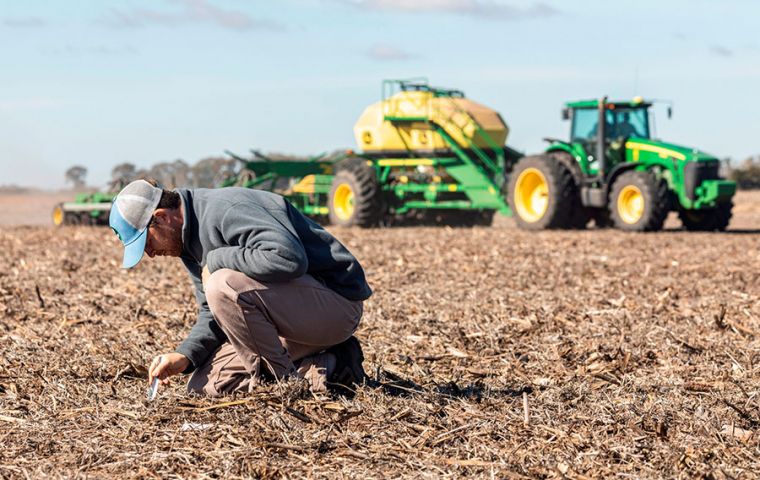MercoPress. South Atlantic News Agency
Fertilizers from Iran and expanding the wheat area, priorities of Brazil's agricultural year
 Brazil consumes some 40 million tons of fertilizers annually, 85% of which imported, mainly from Russia (20%) and Eurasia (65%).
Brazil consumes some 40 million tons of fertilizers annually, 85% of which imported, mainly from Russia (20%) and Eurasia (65%). Brazilian fertilizer stocks amount to at least 13 million tons, including the inputs that have been already internalized and the ones that have been ordered. The statement comes from David Roquetti Filho, a former board member of ANDA, Brazil's National Association for Fertilizer Diffusion, and currently an independent business consultant.
“Much fertilizers has been bought in anticipation,” said Roquetti, during a webinar promoted by Insper Agro Global on the theme, “Geopolitics and challenges for Brazilian agriculture in turbulent times.”
Roquetti added that stocks should last for four months. Brazil consumes some 40 million tons of fertilizers annually, 85% of which imported, mainly from Russia (20%) and Eurasia (65%).
Thus concerns about the consequences of the conflict between Russia and Ukraine are “real and severe“ but ”should not lead to panic.” Roquetti added that Brazil still has some time to prepare for 2023. “If something is eventually missing (such as fertilizers for planting in the next harvest), it will be mostly specific” However, there is still a big question mark: how long will the war in Eastern Europe last? “That is the key to the whole uncertainty”.
Nevertheless Brazilian foreign minister, Carlos Franca who participated of the conference anticipated Brasilia is looking for a way to increase bilateral trade with Iran, which means discussions with the United States that has imposed sanctions on Teheran over the atomic weapons development controversy.
“Since Iran is currently subject to US sanctions, a waiver mechanism of contractual clauses could pave the way for some of the product exclusions to be relaxed, particularly fertilizers,” said the foreign minister.
In addition to fertilizers, the impacts of the Ukraine conflict on the wheat market were also addressed, since grain prices have skyrocketed and staple food items such as bread and pasta prices have also gone through the roof.
Minister of Agriculture, Tereza Cristina da Costa Dias said resources provided for in the 2021-22 Harvest Plan could help regulate domestic wheat prices. Besides there is a plan to expand the wheat area in Brazil, but funds must be released quickly since sowing season begins soon.
“We’ve been working hard to increase Brazilian wheat supply. And it’s working so well that wheat is now being planted as a second crop. Soybeans are planted first, followed by wheat, just as corn and soybeans are. It is a wintertime culture. We know that farmers are considering increasing wheat crops, so the time is right for the 2021-22 Harvest Plan. Our main concern is that the planting season begins in April. Agriculture is not a patient industry. There is a season for planting and harvesting. That is where we are concentrating our efforts,” emphasized the minister.




Top Comments
Disclaimer & comment rulesCommenting for this story is now closed.
If you have a Facebook account, become a fan and comment on our Facebook Page!